Cast your mind back to late July, 2015. It was the month a then 22-year-old Irish amateur from Greystones announced himself to the world on the biggest stage of them all, The Open Championship, at the Home of Golf.
Leading after 54 holes, Dunne may have dropped off the pace and finished that week in a tie for 30th as Zach Johnson claimed the Claret Jug, but he earned something money can’t buy, experience.
Dunne was long-fancied to be one of Ireland’s golfing stars of the future, turning heads with a stellar amateur career and a scholarship to the University of Alabama to boot. A US College Golfer of the Year title, a quarter-final appearance at the US Amateur and a degree in business finance later, he was making a name for himself stateside too.
Then came the Open Championship and two months later, the Walker Cup. In a team containing five Irish players, the GB&I squad outclassed their US counterparts, winning 16 and a half to nine and a half, while Dunne capped off his amateur career by holing the winning putt.
The professional ranks soon called and his first test was European Tour Q School. He breezed through Stage One and then came through a six-man playoff for two places at his Second Stage qualifier. He eventually finished the gruelling 6-day examination of Final Stage in a tie for 13th, claiming a prized 2016 European Tour card.
Progression was coming thick and fast for the 22-year-old and in his Rookie Year on Tour, the Greystones native competed in 21 events. Dunne may have struggled slightly through the middle of the season, missing nine cuts, but when required, he displayed his ability to produce under pressure.
Back at St Andrews, he banished any bad memories from his Open Championship final round, earning his biggest cheque of the season at his penultimate event, The Alfred Dunhill Championship.
The finish moved Dunne up to 106th in the Order of Merit, just inside the top 110 that kept their cards, and looking back on it now, he can smile at how far he’s come, from entering the unknown to coming out the other side a prematurely experienced winner on Tour:
“I didn’t have any expectations because I had no idea what to expect. I just wanted to play and see how I fared and I think once you play a year and you match up to everyone else your mindset changes. At the start of the year what I knew about the Tour was completely different to what it was when I finished the year.”
“I didn’t know what tournaments I would get into, I didn’t know that only having a Q school card meant I didn’t get into a lot of events. I didn’t understand that you couldn’t schedule properly. But I learned a lot from my first year and going into the 2017 season I had a better understanding of what events I was playing in and what standard I was at.”
Dunne’s career is the epitome of an upward curve trending nicely, a tale of steady progression without ever getting lost in the next step along the way. He acknowledges that for some, setting a life goal and working backwards might be a blueprint to achieve such aims, but Paul has lived his life in the present, refusing to get distracted by the multiple doors being opened through his amateur exploits.
“I started out playing junior events, then all of a sudden I was on the Irish panel. That led to a Senior Panel, Senior Team, College, Walker Cup and then the Pro ranks. That’s the way it worked out.”
“I wasn’t 15 thinking, ‘These are the things I am going to do, that I am going to end up here’. It just kind of happened, but that gives me confidence in the way I work. It means that the way I practice, the way I do things has had progression and is working.”
“Last year was a good year for me. I finished in the top-20 in Dubai and won my first Tour event. I mean, I’d obviously love to finish in the top-10 this year and win more, but I am not overly stressed about it.”
“In golf, you’re going to have great years and you will have bad years. 2017 was a good year for me but hopefully in my overall career, it just looks like a normal year and it won’t be the best year.”
Listening to him speak so maturely, it’s no wonder Dunne’s transition to the professional circuit proved so seamless. It’s no secret that working under the GUI banner and through Team Ireland commitments, these guys are prepared at an early age for a life beyond the amateur game. Still, being overwhelmed could be excused when entering such illustrious company.
“You just have to back yourself and believe that if you play well you’ll beat the other guys when they play well. I think it’s more getting used to the travels, seeing how you handle it. I had never travelled that intensely, never played that many tournaments in a year, different countries, different grasses, different climates.”
“The stress level is a bit higher but it’s the stuff outside golf that you need to get comfortable with, and then once you get used to that you stop thinking about it.”
Professional golf at this level doesn’t afford a player the luxury of time to get comfortable. Rather, experience is gained at the deep end and either you sink or you swim. Although he had played many tournaments where he was in around the lead, Dunne points to Morocco as his first real taste of getting in contention – a true watershed moment that has stood to him ever since.
“Morocco was the first time that I gave myself a lead so I was definitely in it from the start. I thought I played well that last day in Morocco. To be honest, at stages during the last few holes I thought I had it won. Then all of a sudden Edoardo Molinari finished birdie, eagle, and I think that actually helped me for the British Masters because I had that feeling, that if I didn’t win, someone would need a spectacular finish to catch me.”
“Some people called Morocco unlucky but it was an invaluable learning experience because I learned that enough is never enough. If you come down the last, you want as many shots of a lead as you can get.”
“In the British Masters, once I got a lead early in the final round I just wanted to keep it steady. A three shot lead wasn’t enough, I wanted a five shot lead. I wanted to be so far ahead that there was no way anybody could catch me.”
And so it came to pass – Dunne, having soaked up the experience of his Moroccan near miss, was ruthless when the opportunity arose once more.
“The most satisfying thing that I got from Morocco was that I loved it, I loved being in contention until the end. The hardest thing to do on Tour is trying to finish strong when you’re out of a tournament. It’s hard to play when you have six holes left and you’re in 36th place. You know if you make a few birdies it helps you on the money list, but you don’t care really. The adrenalin has gone and it’s just a flat feeling.”
Fortunately for Dunne his performances last season meant such feelings were scarce, and when victory presented itself at the British Masters, he grasped it with both hands.
“I took everything I learned into that final round of the British Masters. I was in the last group and the leaderboard was fairly tight with a lot of players within three of the lead. I knew someone was going to shoot six or seven under and that a quick start was needed.”
He duly delivered, birdieing the first, fourth and fifth holes before dropping a bomb, an eagle at the par-5 sixth – did the game plan change?
“It all happened so fast and after the eagle on six I looked at the board and saw I was three ahead. From then on, I just didn’t want to make a bogey but knew I had to stay aggressive and give myself birdie chances. I remember I got really lucky on the 11th when the ball went long and kicked back off the sprinkler head, I have never seen anything like that. When you get breaks like that it’s a big bonus and I remember thinking I better take advantage of this.”
“I hit my worst tee shot of the day on 12 into the trees but made a good recovery and ended up making quite a tricky little 7-footer for par – that was big for me. I rolled that putt in and knew then it was mine to lose.”
“On the 13th tee I said to my caddy Darren, if we play the last six in 2 under nobody can catch us. Honestly, I thought if I play the last six level I’d probably win but Rory was on a charge and I was still expecting him to do something special like Edoardo did a few months before in Morocco to pip me.”
“It was special to finish strong and hole out on the last, it was a great feeling.”
Images by Getty Images
Whereas doors may have opened that he ignored through his amateur years, a maiden European Tour title at such a prestigious event was always going to be a game changer. A trip to China beckoned for a first crack at a World Golf Championship, as Dunne’s schedule turned on its head.
“Looking back, I probably should have skipped the event in South Africa or the one in Italy. The intensity of the travel between the tournaments was hectic and I ended up just too tired.”
“You feel like you have to go because the money is big in the Rolex Series events and China had no cut. So there’s free money, free world ranking points just for teeing it up. What I realise now is that you might come 30th two weeks in a row, but if I had taken one of the weeks off and finished top-10 in the other, it would’ve worked out much the same.”
“It was another learning curve. There’s no point in playing because you feel obligated to play. I had never had that problem before, though it’s a nice one to have.”
Indeed the contrast in terms of scheduling between his Rookie Year and that of 2017 is a stark reminder of just how far Dunne has come in such a small space of time. From his Rookie existence as an ‘On-Call golfer’, never sure where the next event would arise, to a schedule brimming with exciting opportunities the year after, Dunne acknowledges this balancing act as one of the key aspects to continuing his rise through the sport.
“A big positive for me last year was scheduling time off which I did well until just before the end of the season. It’s so important to arrive into a competitive week feeling 100% but the last five or six weeks of the season going into the Final Series, I felt I was playing terrible.”
“I just felt so uncomfortable. It was strange because they were the biggest events of the year. I was trying to find something and just couldn’t put four rounds together. But it’s very hard to do that when you’re feeling that way.”
“It was the first time since the middle of my first year (2016) that I was waking up in the morning and I wasn’t looking forward to playing, I was kind of going through the motions thinking I can’t wait to get a break. That’s a sure sign I scheduled wrong in the lead up to it.”
“Again, it’s a learning thing, I scheduled really badly in the two months after I won. I played the last eight weeks of the season and I think 13 of the last 15, it just caught up to me.”
Dunne’s breakthrough season puts him on the cusp of even bigger scheduling headaches in 2018, with the top-50 in the world a real possibility should he start fast next year – something he hasn’t overlooked.
“I will probably do two schedules this year – a schedule dependent on my world ranking getting pushed up and a schedule if that doesn’t happen, otherwise it’s just too much guess work. I am 76th now and if I get off to a good start in 2018, then all of a sudden if you’re in the top-64, you get into the Match Play. Win a few matches there and you get into the top-50 and the Masters.”
“But to be honest, I haven’t really looked at it too intensely because I just want some time off now. I know I am playing the EurAsia Cup, Abu Dhabi, Dubai- they’re my first three, but apart from that I haven’t written out the full schedule, plus now I am fully aware of how fast things can change.”
Dunne’s rise has been aided by some sound advice from compatriots Padraig Harrington and Shane Lowry, who know all too well of the challenges that come with juggling schedules on both sides of the Atlantic.
“The biggest thing that they said to me is if you’re getting invited to play at a tournament in America, just make sure you think you can do well in it, don’t play just because it’s the PGA Tour.”
Thankfully that advice shouldn’t be a problem to adhere to. With the Ryder Cup in 2018 an achievable target as things stand for Dunne, who is in the European Team to compete at the EurAsia Cup, opportunities to impress and win on European soil have simplified his outlook.
“The way I look at it is simple. For the EurAsia Cup, I qualified for the team. If I didn’t qualify for that team I would not get picked, which is fair. I would completely understand that, but I reckon it’s the same for the Ryder Cup, if I qualify for the team, great, but I am not going to get a pick. They’re going to pick people with more experience who have done better for longer, which is the right thing to do.”
“There’s only four people to qualify from the European Points List. I’ve won once in the Ryder Cup cycle, I’d have to win again, and you might have to win twice. That kind of simplifies it for me so I’m not really worried about it. I know it’s very difficult to make the team and I’d love to make it someday, but my focus will be just to win.”
Dunne has entered an era of lucrative opportunity on the European Tour, with the establishment of the Rolex Series encouraging more players to compete on Continental shores. And although the increased prize pots are welcomed, the fledgling pro recognises the difficulty such events pose to young up and comers trying to maintain status on Tour.
“It’s always been about €250,000 every year for the last 10 years to keep your card. All of a sudden last year it went to like €380,000 with the Rolex events. It just means that if you’re not getting in to these events it’s even harder to keep your status.”
“A lot is made of people with a Q-School card not getting opportunities to play Rolex events but I think that’s okay. They haven’t proven themselves on the Main Tour yet and should have to play well in the smaller events first. If you are good enough you will progress to the next stage. I don’t think the red carpet should be laid out for people, it should be difficult because it’s competitive on Tour.”
“But the disparity is too much between a normal Tour event and a Rolex Series event. It’s €7 million for a Rolex series and maybe €1 million for a normal tour event. My first Rolex event was Wentworth, I think I came 30th. You get a text at the end of the day about what you made for the week and I couldn’t believe it. My reaction was like, no way, you wouldn’t make that for finishing fourth in a normal event!”
“I just think the gap between the big events and the small events is too big. With the field that the Rolex series events attract, it’s obviously much harder to win an Irish Open or a BMW Championship than it is an Austrian Open, but is it seven times harder? Probably not.”
“Don’t get me wrong, the Rolex Series has definitely added a huge buzz, everyone’s excited about it. Everyone knows how big they are, and you can see the different level of nerves going out because you know a really top finish or a win is huge.”
“Especially having the Irish Open as a Rolex event, though the Irish Open could be a Challenge Tour event and I am still going to think it’s the biggest event of the year!”
Much was made of a lack of amateur involvement in this season’s Rolex events and it felt wrong to let the chance to ask Paul slip by regarding their contentious omissions.
“It’s a strange one because if you have an amateur that’s sensational then they should be given the opportunity to play. Take someone like Rory McIlroy, when he was 16, he was unbelievable and was getting into Dubai.”
“I think if an amateur is very high up in the world rankings and very well regarded, then they’ll probably get a sponsor invite. The sponsors will actually want them there.”
“But it’s harsh for someone who has come second on the Challenge Tour last year to miss out because an amateur that might be ranked 200 in the amateur world rankings gets in because he’s from the host venue’s country.”
Spoken like a seasoned campaigner, Dunne has come out of his shell in recent times. From a softly spoken amateur embarking on an intimidating but exciting journey, he may still be quiet, but he speaks with a new found authority. Have the events of this past year forced a change, or is Dunne still the boy from Greystones coming to terms with an ever growing spotlight?
“I love being at home, I love being in Greystones and while I do get a bit of attention in Greystones, I have done for the last couple of years even since the Open, so for me nothing has changed there.”
“When I see my family, as much as they root me on and wish me well in tournaments, when I’m home they just don’t care. I am just me to them and we’re just family. But there is a bit more attention around me since the win. This time of year you start getting invitations to sports awards and things like that. You start looking at other top Irish sports people and see how they live their lives and that gives you a bit of motivation to work harder, be a bit more professional and make better choices.”
“If you look at someone like Johnny Sexton, he’s one of Ireland’s top sports people and all of a sudden you find yourself doing a visit or doing a thing with him. And you think gosh, I reckon he works really hard and he does these things to improve, I could take a leaf out of his book and things like that.”
“If you’re around more people like that, it becomes more normal but then also you live your life better, you all of a sudden become healthier, less worried about partying and more worried about performing. I am a fan of pretty much all Irish sports so to be associated with people like that is a great honour, but it’s also motivating.”
“Last year I visited the kids in Crumlin Children’s Hospital, me walking around with Robbie Keane and Sexton and I remember thinking, I kind of want to be sitting with the kids asking the two boys questions.”
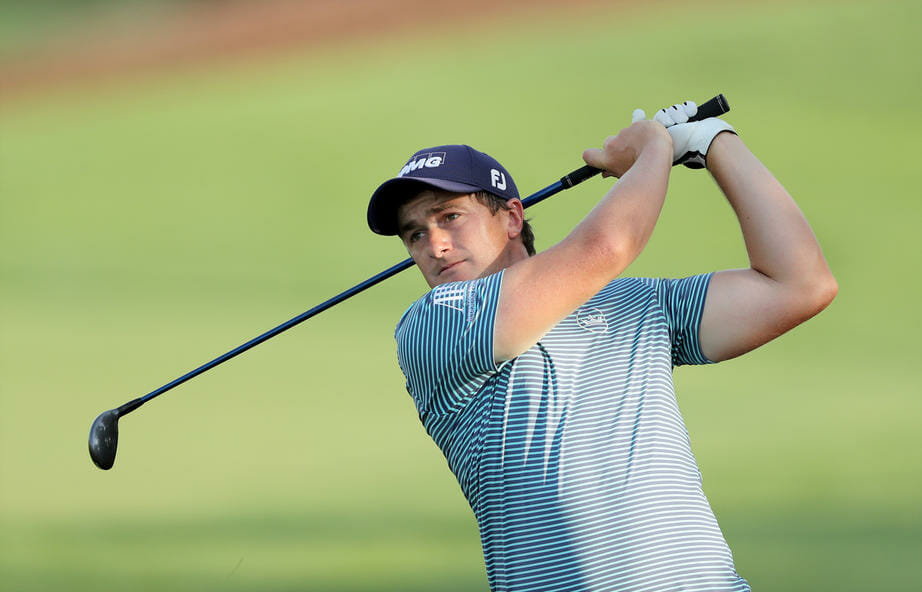
If there was one particular moment of recognition that sticks out for Dunne, however, it was a very meaningful letter from a certain larger than life President. No not Trump, someone much more important.
“After I won the British Masters I got a letter from the President, Michael D. I mean that’s the coolest thing ever. It was probably only a few hours after being delivered and my Mam had it framed and up on the wall at home. The thing that really stood out was that it was not a generic letter that Michael D had just signed his name under. The last few paragraphs were hand written, it was such a nice touch. Knowing the President took time to reach out and do that was a very cool feeling as I am sure he is a very busy man.”
As is Dunne, but sitting down chatting to Paul, you can really feel the level of respect and appreciation he feels towards fellow Irish sports people. He has already adopted many of the same attributes you’d associate with Harrington, most notably his mental strength and total belief in his own ability.
He may have just finished inside the top-20 of last year’s Race to Dubai, and claimed his first career title in 2017, but Dunne, like Harrington, remains a pupil of the game, constantly evolving and looking to improve.
A student who loves the hard work and graft it takes to become a top player, like Padraig, Dunne will often be seen as the last one leaving the range at night, not necessarily looking for a fix but more often trying to maintain something he has found. Trying to engrain a feeling or a movement into his muscle memory, the constant chase for perfection.
To end our chat, I asked Paul what’s his favourite thing about being a professional golfer. He gave me two answers, and I might as well have been speaking to Padraig himself, such was the level of enthusiasm and passion he exuded.
“I love being in contention, that feeling of having a chance to win and being right in the mix on the back nine on Sunday and knowing it matters,” he began. “But also, just a simple thing like striking the ball really well. When you find something you really want to keep and you just want it so much.”
“Even when I’m not hitting it well, it’s like a constant search to rediscover it. Feeling the strike off the face, watching the flight of the ball, I love it. I will stand on the range for hours when I have a good feeling to try and keep it. Then to be able to deliver that under pressure during a round and pull it off. There is no better feeling in golf for me.”
If Dunne continues on the steep curve of progression he has shown to date, the sky really is the limit for the young Greystones man. For now though, he can enjoy a well-earned rest, knowing he has the game to mix it with the very best in 2018.
If you have followed Paul over the past year you will no doubt have seen Larry on his driver. We had to ask, where did Lucky Larry come from. ??
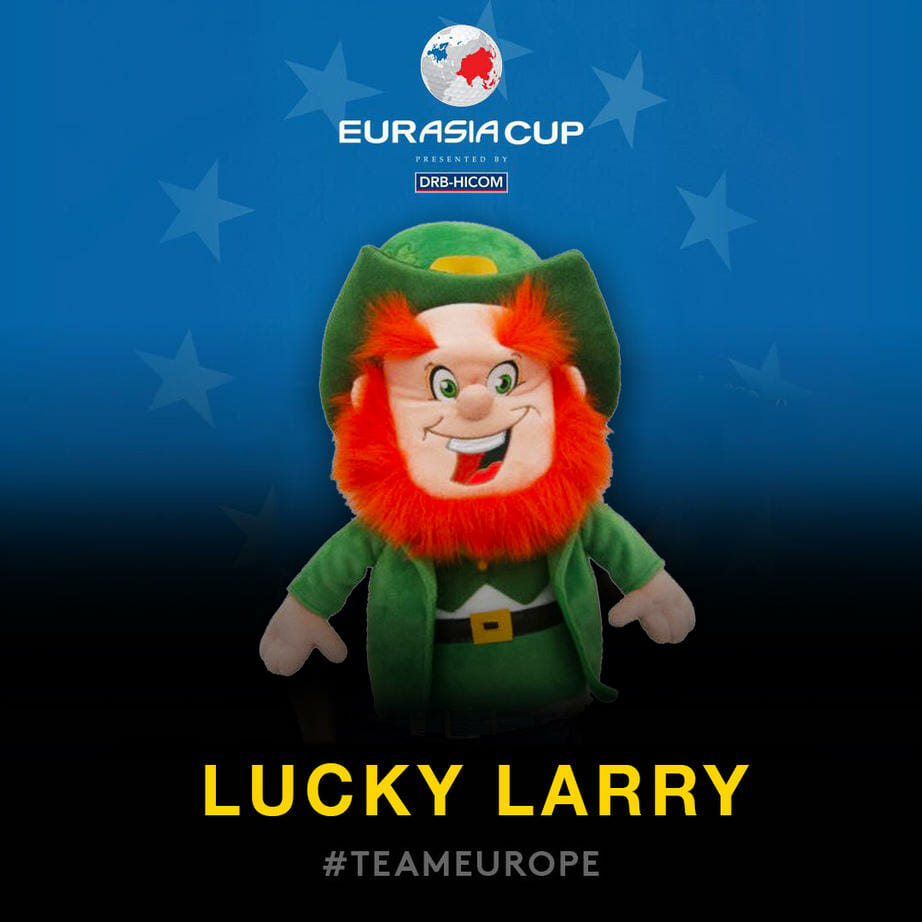
I was in Dubai last year doing some pre-season practice with Gavin Moynihan and Gary Hurley. We were heading out at the Emirates Club for nine holes under floodlights and I saw Larry for sale over in the corner of the pro-shop. I had to get him. Darren my caddie loved him and Larry became the star of Darren’s social media posts. It’s a bit of fun. 2017 Larry is retired now after travelling the world and I have a new Larry for 2018. I have put 2017 Larry on a shelf at home and will hopefully end up with a freaky room full of Leprechaun head covers in years to come.

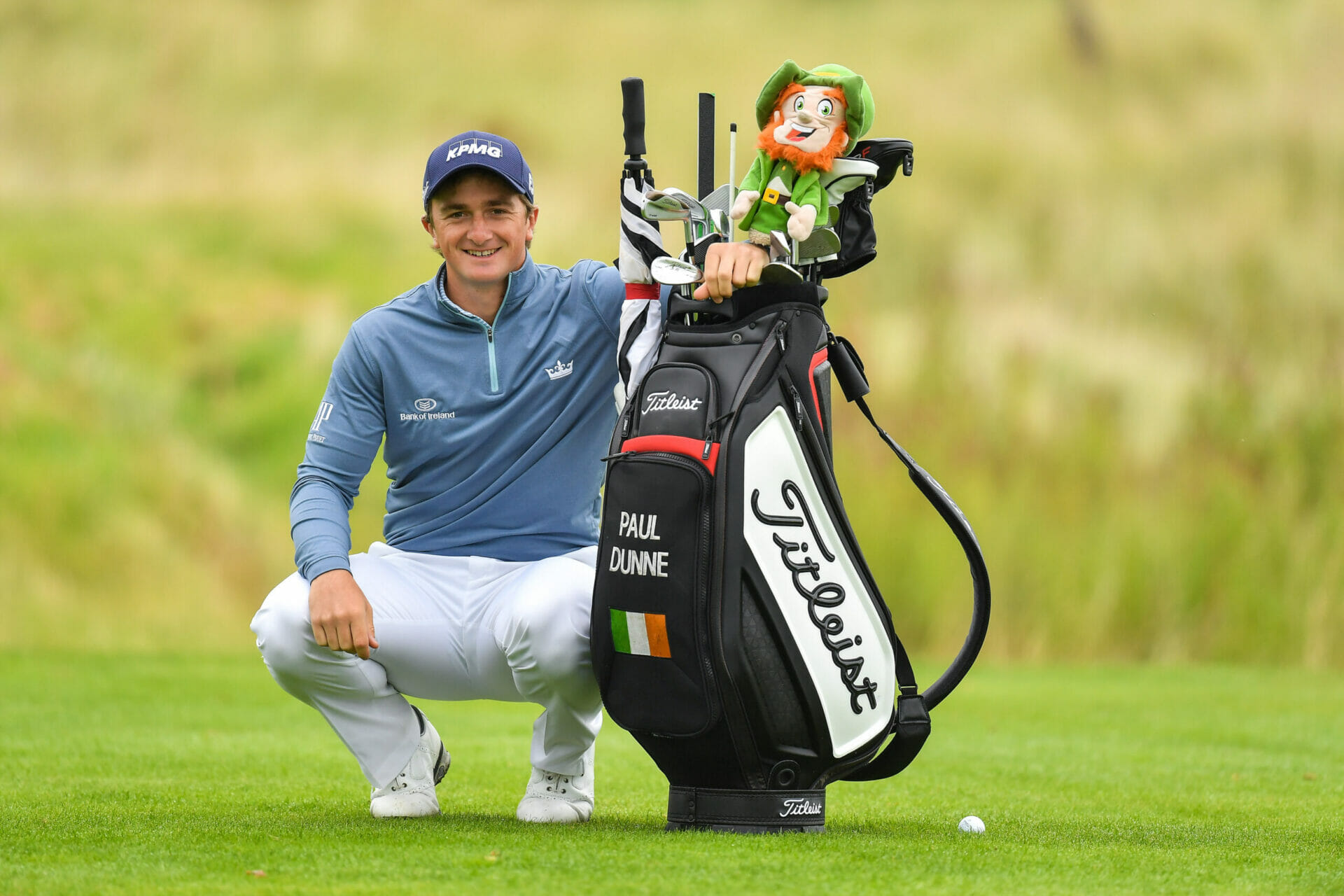






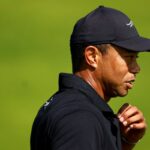














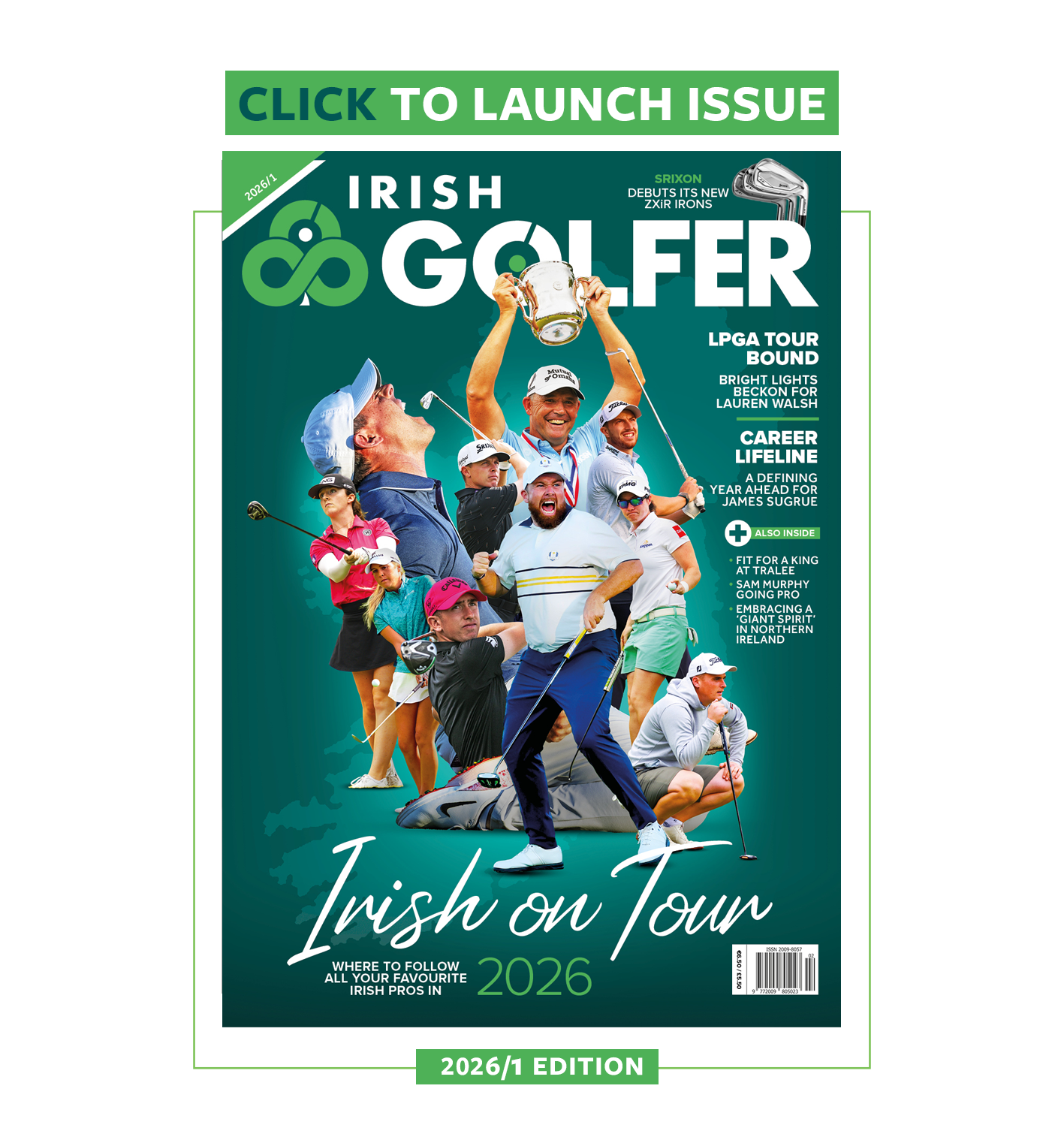
Leave a comment